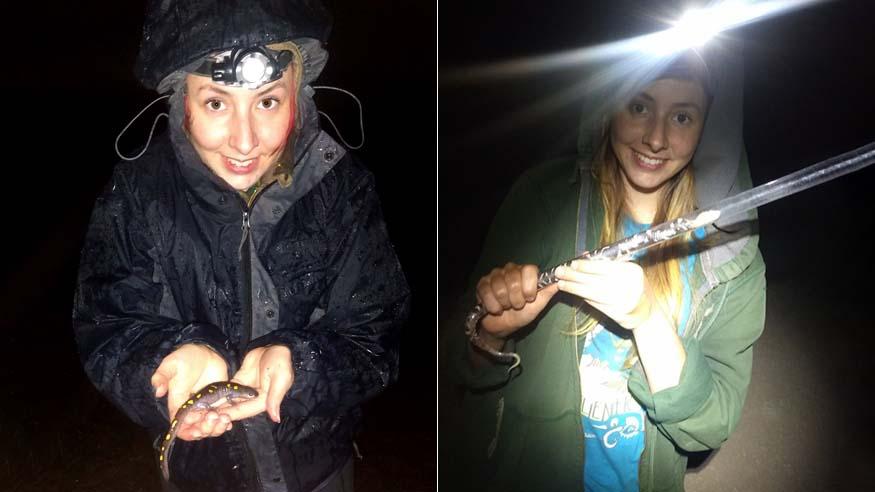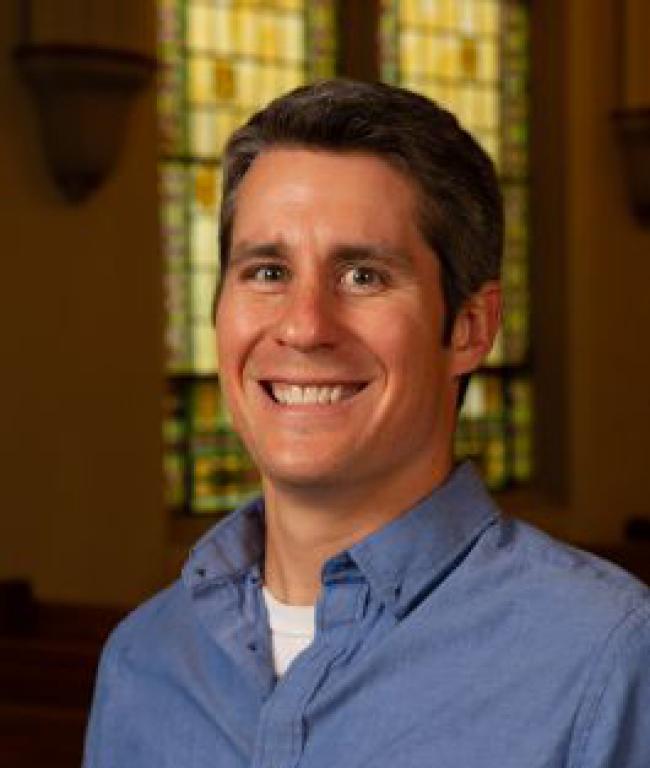
Doctoral student McKenna Burns '17 finds a spotted salamander and a Trans-Pecos copperhead (venomous, in a tube) while doing fieldwork for research in Ohio and Texas.
Burns ’17 helps future biologists focus on biology
The world needs Augustana graduates. Here's why.
Not long into her doctoral studies, McKenna Burns ’17 set out on a mission close to her heart. She wanted to help biology undergraduates who face sociological barriers learn computer skills necessary for success as biologists.
Burns is in the Ph.D. program in ecology, evolution and environmental biology at Miami University. But while an undergraduate studying biology and Scandinavian studies, she often wondered if she deserved to be at Augustana.
“Underrepresented minority groups and students with low socioeconomic standing are more likely to suffer from imposter syndrome, this feeling that ‘they don't belong’ and that ‘they will be found out’ soon for not being good enough to be where they are,” Burns said. “I suffered from this throughout my undergraduate years without knowing what it was.”
Her academic success fueled by strong faculty support proved she was indeed “good enough,” as she was elected to Phi Beta Kappa membership upon graduation from Augustana.

Dr. Tim Muir
Biology associate professor Dr. Tim Muir remembers McKenna as one of his hardest working students, challenged by heavy course loads and the need to work multiple jobs.
“She created the computer skills workshop as a way to combat the imposter syndrome in other young scientists,” Dr. Muir said. “I am extremely proud of her, but not surprised.”
Grateful for faculty support
At Augustana, Burns could do basic equations in Excel, but didn’t have the confidence to enroll in a computer course. Encouraged by her biology professors, she applied to a competitive Research Experiences for Undergraduates (REU) program funded by the National Science Foundation (NSF). There she learned the basics of R, a coding language/environment broadly used by biologists for statistical analysis. It was a start.
Faculty continued to support Burns’ Augustana journey. She began working with Dr. Muir but couldn’t afford to volunteer her time. So Dr. Muir helped her apply for an IINSPIRE-LSAMP grant, which then funded a paid summer research internship. With Dan Herrera ’17, she continued with Dr. Muir's cryobiology and Dr. Tierney Brosius’ tiger beetle research projects. The team recently published a paper on their research in Cryoletters, with Burns as the lead author.
“I wouldn't be in the position I am in today if I didn't have a hand up from the faculty who donated their time and energy on me — not expecting anything in return,” Burns said. “I owe a special thanks to Dr. Brosius, Dr. Muir and Dr. Geedey.”
Burns is giving something in return. She is offering “a hand up” to students similar to herself.
I owe a special thanks to Dr. Brosius, Dr. Muir and Dr. Geedey.
Biologists have access to huge amounts of data, she says, but must understand how to work with and analyze it to be successful. That’s behind her mission to offer computational instruction to underrepresented biology undergraduates in a low-risk environment at no cost.
“Coding and analyzing data is fun, but it’s very scary at first,” Burns said. “It’s impossible to code and not fail sometimes…codes won't work and things won't make sense.”
She said this can create a vicious cycle, especially for those who didn’t learn these skills as undergraduates.
“When something doesn't work, they may think ‘It's because I can't get it to work because I'm not good at coding,’” she explained. “It’s healthier to think, ‘This code didn't work because coding is hard,’ and trying again without the stress of ‘failure’ on their mind.”
Dr. Tereza Jezkova at Miami University agreed to sponsor a grant for Burns’ workshop, though colleagues expressed concern that the time and work involved could interfere with their careers — especially Dr. Jezkova’s tenure process and Burns’ work on her dissertation.
“This didn't matter to us,” Burns said. “Both Tereza and I benefited from programs like these in our undergraduate careers. They changed the course of our professional lives.”
Ready to go virtually
Then came the question of funding. Fortunately, Burns secured generous funds from the M.I.A.M.I. WOMEN Giving Circle and also several Miami University faculty members, who added the workshop to their NSF grant applications under the heading of “broader impacts.”
In 2019, Burns’ first Computer Science in Modern Biology workshop was held in person at Miami University. Due to COVID-19, the August 2020 workshop will be virtual.
The weeklong workshop offers 14 classes taught by volunteer faculty and Ph.D. candidates. Students learn how to use R, Python and GIS with real biological data generated by Miami University Laboratories. Cumulative findings are presented at the conclusion of the workshop, and many projects will result in publications in peer-reviewed journals.
In addition to learning computer skills, workshop participants can network with biology professors and Ph.D. candidates and learn about different career paths.
“Biologists usually don't become biologists because they like computers — they like biology,” Burns said. “That’s why we’re helping students gain these skills in a low-risk, supportive environment — so they can get back to the biology!”
